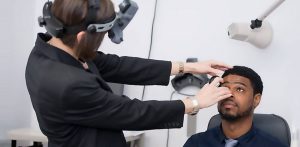Each year, approximately 850,000 visits to the doctor and emergency room are associated with double vision.
Double vision, medically termed diplopia, can be very worrisome. If you are seeing one object as two separate or overlapping images, you are experiencing double vision.
Double vision can be temporary or long lasting. There are three different types of diplopia:
- Horizontal diplopia occurs when the two images are seen side by side.
- Vertical diplopia occurs when one image appears higher than the other.
- Monocular diplopia occurs in only one eye, and is noticed when the other eye is closed.
Why am I seeing double?
Each eye creates an image that is sent to the brain for interpretation. The brain processes the visual information from each eye and combines them to produce a clear, single image. When a problem arises within this process, the brain cannot accurately interpret the two visual signals, and a double image can result.
What causes binocular double vision?
Strabismus, or an eye turn, is the most common cause of double vision, especially among children.
Strabismus occurs when the eyes are not aligned properly and one eye turns in a different direction, resulting in two different images of the same object.
While this condition can cause double vision, it doesn’t always. In many cases of strabismus, suppression will occur, in which the brain will actively shut off the affected eye to avoid double vision. If strabismus is left untreated, permanent vision loss can occur in the suppressed eye.
Convergence insufficiency (CI) is another common vision condition that can lead to double vision.
Convergence insufficiency occurs when the eyes are unable to work together to focus on an object, for clear, single vision. The double vision caused by CI is usually only noticed during times of excessive fatigue or stress.
Double vision may also be caused by any of the following conditions that can affect the nerves or ocular muscles that control eye movement:
- Stroke
- Traumatic brain injury
- Brain swelling
- Brain tumor
- Brain aneurysm
- LASIK, PRK, or any other type of refractive surgery
- Cranial nerve palsy
- Thyroid dysfunction
- Diabetes
- Myasthenia gravis
- Multiple sclerosis
Seek emergency medical attention for any type of double vision, to rule out a serious health problem that may be causing your distorted vision.
Never ignore any type of double vision, especially if it comes on suddenly and goes away on its own for a while— this may be the brain suppressing the vision from one eye, and concealing a serious health problem.
What causes monocular double vision?
While this type of double vision is less common than binocular double vision, it can still occur as a result of the following conditions:
What causes temporary double vision?
Temporary double vision can be caused by excessive alcohol consumption, extreme fatigue, or certain drugs, such as benzodiazepines, opioids, or medications for seizures and epilepsy.
Head injuries such as concussions may also cause temporary double vision.
Caution: If you have suffered a head injury, see your doctor or visit your nearest emergency room as soon as possible.
SEE RELATED: Prism Lenses for Double Vision
Contact an eye doctor near you if double vision continues to affect your daily living, and does not disappear quickly, it may be caused by a more serious problem.
How is double vision diagnosed?
Since double vision can occur from a large variety of conditions, ranging from benign to life-threatening, it can be difficult for an eye doctor to diagnose.
If the double vision is monocular, it is more likely to be caused by an eye condition. However, if the condition is binocular, it may require a multidisciplinary approach for a thorough diagnosis.
How do I know if my child has double vision?
Children cannot always express that they are experiencing a problem, and even more so, what the problem may be. Therefore, it is important to recognize the signs that your child may be suffering from double vision.
The most common signs include:
- Squinting
- Covering one eye
- Turning or tilting the head
- Moving eyes side to side when look at an object
- Using peripheral (side) vision instead of central vision
Can double vision be treated?
Yes.
Treatments for double vision depend on the primary cause of the condition, but may include:
- Opaque contact lenses to suppress vision in one eye
- Vision therapy, if strabismus or convergence insufficiency is causing double vision
- Prism lenses to reduce double vision
- Botox injections to relax the eye muscles and reduce double vision
- Wearing an eye patch to suppress vision in one eye
- Surgery to realign the eyes
If you are experiencing double vision, or believe that your child may be experiencing double vision, see your eye doctor as soon as possible.
LEARN MORE: Guide to Neuro-Optometry
The first step to identifying the cause of double vision is to determine what type of diplopia you may be presented with. After a proper diagnosis, your eye doctor can prescribe an effective treatment to reduce double vision, for a more comfortable way of seeing.










